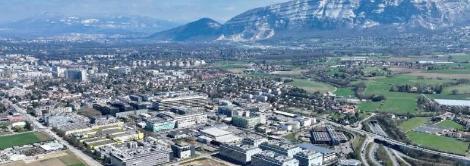Densification through mutualisation: the case of the canton of Geneva
Practical notebook no. 16: (Re)developing productive activities in metropolitan regions
Thierry Petit, November 2024
Covering 3% of Geneva’s territory (or 723 hectares), the Industrial Zones are a source of jobs and innovation: 4,800 companies employ over 80,000 people. Today, the Industrial Zones are evolving in a context of strong demand but also scarcity of land, calling for the rationalisation of space. This development is based on controlled, shared planning of facilities, strategic support in the search for space and locations, and a concerted policy of sectoral mix.
To download : cp16_ok_bat_web.pdf (7.3 MiB), genieatelier18.pdf (6.7 MiB)

Very early on, the canton of Geneva in Switzerland was faced with a shortage of land and growing competition between different uses and activities. As early as the 1960s, it came up with the concept of protected zones dedicated to the industrial and craft sectors, initially within a specific perimeter and then, in the 1990s, extended to a set of zones covering 3% of the territory, or around 800 hectares today. To ensure that it had control over the land, the canton of Geneva set up a right to build on the land, equivalent to an emphyteutic lease in France, which was entrusted to the management of what was to become the Fondation pour les terrains industriels de Genève (FTI), a property company created for the purpose. The FTI, a property foundation governed by public law, is financed exclusively by income from long leases and rental income from its property portfolio. To date, the FTI has been entrusted with the management and development of almost all of the 800 hectares reserved for industrial and craft activities, and is developing the 212 hectares that it owns outright. These sites are home to a number of major industrial groups, as well as craftsmen and small businesses that have been pushed out of urban areas, and the question of how to optimise the use of land arises at a time when demand for space is growing in a highly constrained region. In response, the FTI is implementing vertical densification and offering services (shops, restaurants, leisure activities) by taking advantage of different constraints compared with productive activities, such as installing a restaurant on the rooftop of a business hotel to reserve the ground floor for heavy activities. This can also be achieved by introducing office activities either within existing business hotels on the upper floor, or in juxtaposition to productive activities, thanks to the creation of a new mixed activity zone regime (secondary and tertiary sectors). Another, more original approach involves the sharing of space between several manufacturing companies, whether for services or premises directly related to their activities. Three examples in progress illustrate the different methods used to achieve this.
Sharing equipment and certain areas between two companies
When two companies in the canton needed to relocate, the FTI offered them an available site covering 8,000 square metres: an area half the size of the one they were previously occupying. To achieve this feat and get them to agree to the relocation, the FTI carried out a long process of consultation and construction with these two companies, which also had commercial links and synergies on a property project. The result of this long process (three years) was the signature of an agreement and a building permit for a common building separated into two parts, but with a common logistics area equipped with a loading crane useful to both companies. This pooling of resources has made it possible to limit their respective spatial footprints and save on investment in equipment and operating costs.
An industrial cooperative for a joint property project
The FTI also had to deal with requests from companies wishing to relocate to one of the areas it manages. These companies wanted to remain close to each other, as they were working on several projects together. However, they did not have the means to finance their own premises separately, which would have required too high a capital contribution, and banks were reluctant to take on this type of project. The possibility of setting up an industrial cooperative removed this obstacle thanks to a guarantee of 30% of the amount of the investment by the FTI, which made it possible to secure bank financing. In addition, the FTI provided its real estate and legal expertise to help set up the project, which is expected to eventually house around twenty SMEs.
Pooling of access roads required
Following a change in the regulations for an area it did not own, the FTI required private owners to agree to the creation of a single access road to replace the various existing roads. This mutualisation, for which a protocol has just been signed, will free up land for a joint silo parking project.
Success factors/needs to be vigilant
Long-term control of the land, which guarantees that the site will remain productive and that rents will be maintained. Businesses have confidence in the FTI, which has been working with them for sixty years and is familiar with their needs, including their operations. The FTI’s in-house expertise in key areas such as architecture, real estate and financial and legal arrangements, particularly its lawyers, which establishes trust and credibility with industrial companies. The pooling project must take into account the various practical aspects from the outset: terms of use and maintenance of the property and equipment, the obligations and rights of the partners if one of the owners ceases to exist, the terms of transfer of the property, etc.
Sources
To go further
-
The attached document ‘genieatelier18.pdf’ is a very interesting report on the management, governance and development of Geneva’s industrial estates, drawn up in November 2024 by genie.ch, Geneva’s industrial ecology and circular economy website.